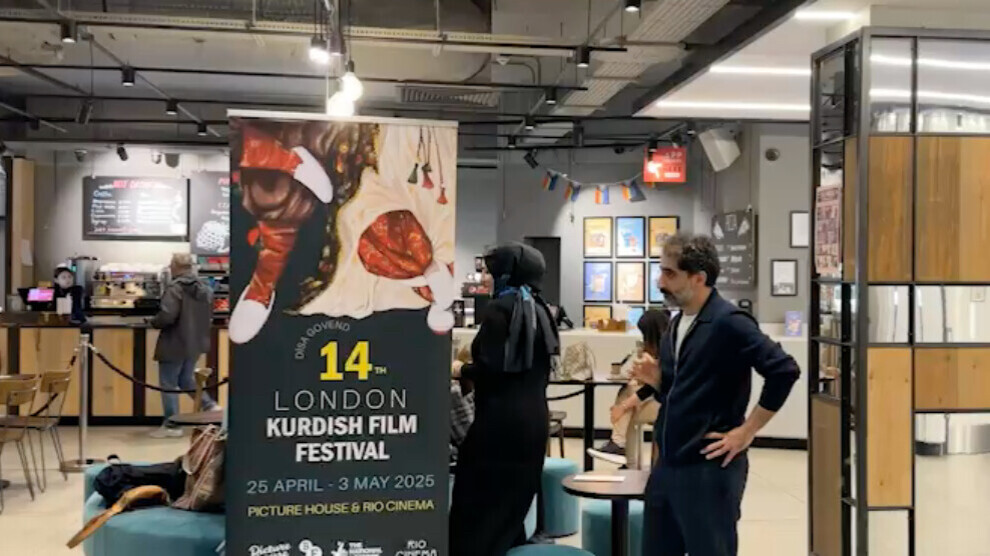Kurdistan stories on screen at London Kurdish Film Festival
The 14th London Kurdish Film Festival presents stories from across all parts of Kurdistan.
The 14th London Kurdish Film Festival presents stories from across all parts of Kurdistan.

The London Kurdish Film Festival (LKFF) offered audiences a cinematic window into the history, tragedies, resistance, and cultural richness of the Kurdish people.
With this year’s theme “Once Again, the Halay” (Dîsa Govend), the festival not only reflected sorrow, but also brought to the screen stories of hope, struggle, and life.
Kurdistan on the big screen
The festival opened with director Hisham Zaman’s ‘A Happy Day’. Set in a refugee camp in Norway, the film ends in tragedy and confronts the audience from the very first moment with the fragility of lives uprooted from Kurdistan.
Young director Bilal Korkut’s ‘The Bar’ stood out with its melancholic atmosphere woven through the poetic sensibility of Kurdish poet Arjen Ari. The film features striking dialogue between an American kurdologist and characters trapped within the historical memory of the Kurdish people. Though it ends in inevitable tragedy, it takes viewers on a profound inner journey.
Stories that touch collective memory
Mediha Güzelgün’s docudrama ‘The Third Exile’ centered on the memories of women who witnessed the Maraş Massacre, while Özkan Küçük’s ‘Good Morning’ (Rojbaş) brought to the screen the enduring resistance of Kurdish theatre against decades of repression. Actor Kemal Ulusoy, who appears in the film, emphasized that this resistance is a reflection of the lived reality of the Kurdish people.
Ayşe Polat’s 'In the Blind Spot' held up a mirror to Turkey’s dark recent history through the lens of unsolved political murders. Short films such as ‘The Island’ and ‘My Son’ explore a wide spectrum of social wounds, from ecological crisis to the constraints of conservative family structures. The short film ‘A House Close to the Sun’ portrayed the pain and hope of a Kurdish tailor who resisted attacks by ISIS.
Women’s resistance and the fight against ISIS
Women’s stories took center stage at the festival. Binevsha Berivan’s film ‘The Virgin and the Child’ tells the story of a Yazidi woman who confronts her ISIS rapist in Brussels, while Kawa Akrewi’s documentary ‘Syria’s Ticking Time Bomb’ highlights the security risks posed by tens of thousands of ISIS members being held in camps in Rojava.
Soleen Yusef’s ‘The Winners’ follows Mona, a young woman who migrates from Rojava to Germany and struggles to rebuild her life through football. Drawing inspiration from a family member who once fought in the Women’s Protection Units (YPJ), the film also explores the deeply personal dimensions of resistance.
Confronting through real stories
Reber Dosky’s documentary ‘The Girls of the Sun’ portrayed the rehabilitation process of Yazidi women abducted by ISIS. One of the most emotional moments of the festival occurred when Sarab Nayif, one of the real-life women whose story was featured in the film, came on stage and shared her experience with the audience.
Throughout the festival, panel discussions brought together directors, actors, and viewers to explore the future of Kurdish cinema, the challenges of filmmaking, and where art and politics intersect. With 58 films screened, the festival offered a powerful reflection of how far Kurdish cinema has come.
Kurdish cinema has grown through resistance
Kurdish politician Osman Baydemir described the festival as “a reflection of a people’s memory and resistance brought to the big screen.”
Film critic Seray Genç drew particular attention to ‘The Third Exile’, stating that it would leave a lasting mark on the memory of the Maraş diaspora.
LKFF Program Director Şehriban Suyur noted that this year more women directors were featured, and that the festival placed special emphasis on stories from all four parts of Kurdistan and the diaspora.
Director Soleen Yusef underlined the importance of solidarity among Kurdish filmmakers, saying: “It is essential that Kurdish filmmakers walk this path together. These festivals are a major step toward the institutionalization of Kurdish cinema.”
Kurdish journalist and educator Alaaddin Sinayiç, who has long contributed to the realization of LKFF, said: “All of these films strive to create great meaning with very small budgets. But now we must work to grow and develop Kurdish cinema even further.”
We show the wounds that are still bleeding on screen
Director Bilal Korkut, whose film was screened at the festival, responded to criticisms about Kurdish cinema’s focus on pain: “Our films reflect the reality of our people. Wherever your wound is still bleeding, that is where you point the camera. When that wound finally heals, then we will turn to lighter, more joyful films.”